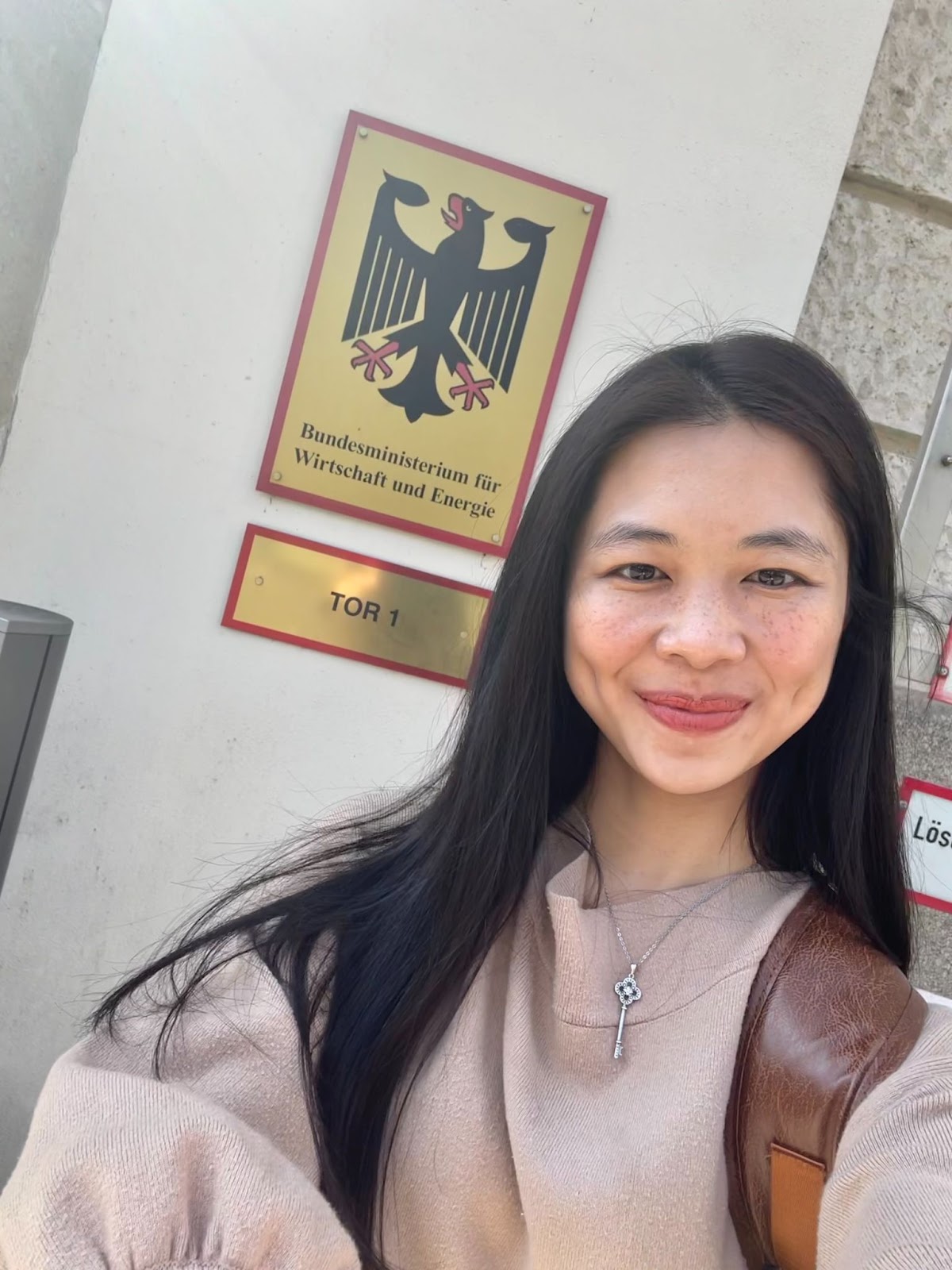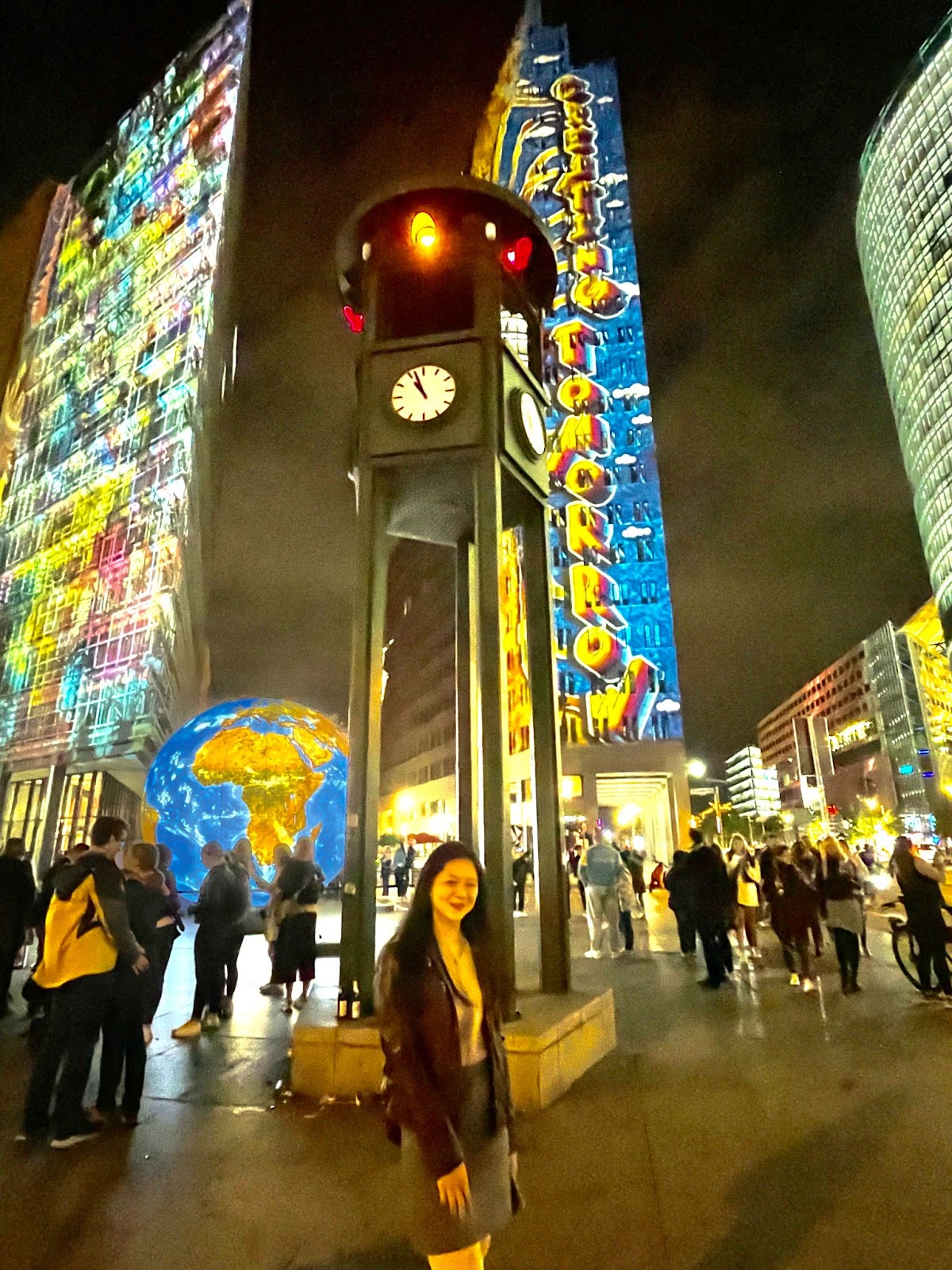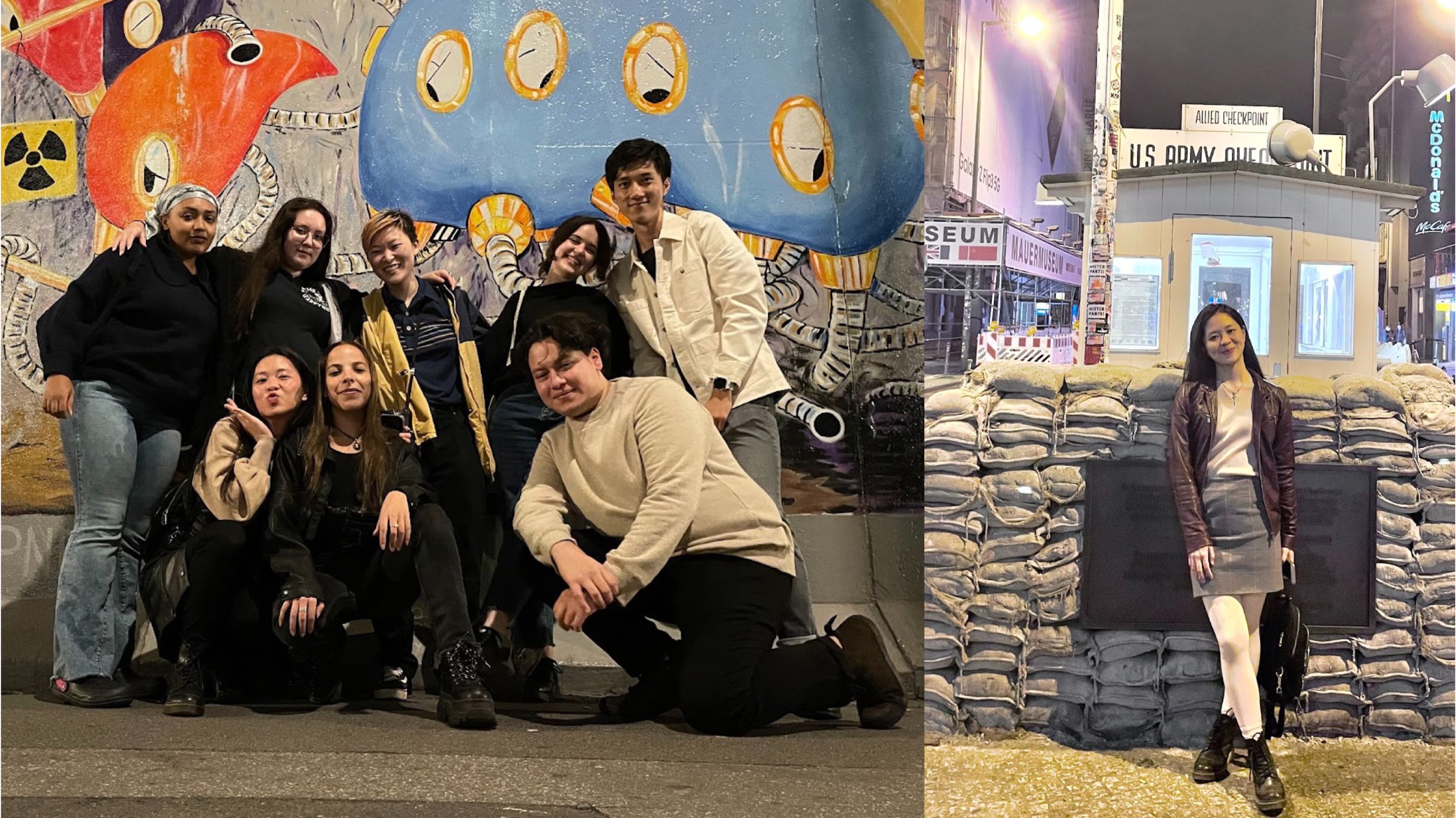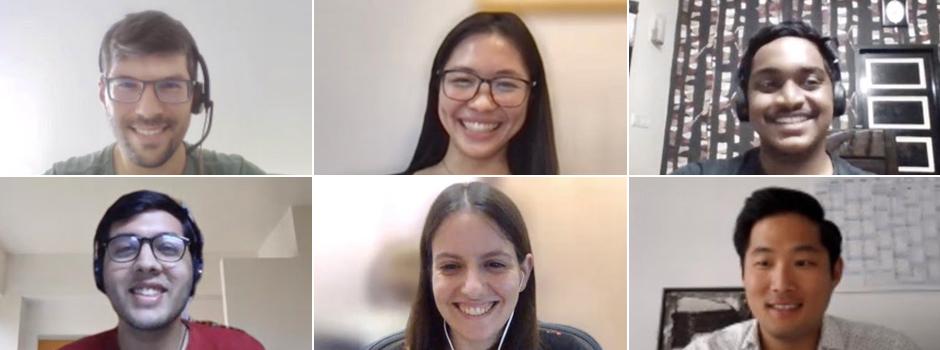Banner image: Having fun with data: Cinny’s team and their German Federal Ministry partner hard at work
Yi-Chen Cinny Lin (CL): Growing up, I never thought I'd have the opportunity to travel around the world. Then I came to NYU and actually had that chance. I am really grateful. My first year I joined TAMID and got to travel to Jerusalem for an internship in the startup world. Their focus on social impact really shaped my values. This startup was using AI, building a device that helps visually impaired people basically translate the very visual world to audio so that they can understand the world. Afterwards I came back to Shanghai to finish my data science studies. Right now I am in Berlin, and planning to go to New York in spring. I’m exploring my options in life and taking classes that interest me.
LZ: You came from a social science background but made the switch to data science at NYU Shanghai. That sounds intimidating! How did you start coding or modeling? Can you speak more to that? CL: I think it's still, to be honest, an ongoing battle. I keep reminding myself that this is my major, this is something I am actually good at, this is how people know me now. I think my advice is to just gain more experience. Just keep learning. It's a nonstop process.
My first internship was more product and business development, nothing technical. My first hands-on data science experience came when I got an email saying Prof. Heather Ruth Lee (Humanities) was working on a digital humanities research project, digitizing archives to better understand immigrant stories in 1800s New York. That was my first time using data science to understand the world. Afterwards, I joined a new student-initiated educational platform called Wave Learning Festival. They already had technical people, but they didn't have data-focused people yet.
My data skills were still pretty rough. But I told them: I am a data scientist with experience making social impact. I sold myself well enough that they believed in me. I believed in their idea and worked really hard. I kept expanding responsibilities I wasn't really given. I worked on a lot of different things, then they asked me to create a data team and lead it. These kinds of experiences gradually built my confidence.
LZ: The fellowship you did, Data Science for Social Good, how did you hear about it? It sounds like such a wonderful opportunity.
CL: I heard about it from my academic adviser, Tony [Shen]. He forwarded an email saying there’s this opportunity, you guys can do it. My roommate was a data science major too, and I asked her “why don’t you apply?”. She said that the application was super lengthy, almost like a college application! It was ten-something pages and you had to answer five or six different questions detailing your technical and social experiences. Most people might be intimidated and would rather apply for a job where you just send your CV over.
But I love writing, I think it's fulfilling. For me it was an opportunity to look back on experiences I’ve had and how much I have progressed. The questions they asked were such good self-reflection for me. So I really enjoyed the process. I actually helped co-write a detailed blog post on the whole experience afterwards.
LZ: That’s great! I think at least at NYU Shanghai, a lot of outstanding STEM students sometimes count themselves out from fellowships, thinking if they are looking for leadership or social impact, maybe it’s not for me. Can you speak to this misconception?
CL: For me, fellowships are about community. I think what I love about them is first of all how you get to know your own group well, but you also get to know about different things other groups are working on. For both TAMID and DSSG, every Friday we had a community-building opportunity. So you get to know each other, learn from each other. For TAMID, we all worked at different companies. For DSSG, there were 16 of us and we worked for different government organizations. We each had a 4-person team, so there are four people that you are extremely close and 16 people you're pretty close to.
These kinds of dynamics are different from a usual internship. For instance, mentors who are really there for you. At least in my experience, sometimes a normal manager gets really busy at work. But we had all these programming and networking activities built-in as part of the fellowship, and that was really, really useful.

Cinny at the German Federal Ministry for Economic Affairs
LZ: Tell us more about the Data Science for Social Good fellowship.
CL: We were 4 groups working on different projects using data science for social good. For example, one of my friends worked with the Chilean government, I think the Environmental Protection Agency. They recently digitized their complaints system. So the group needed to figure out how to extract textual information and categorize the most important stuff, like 10% of complaints are about this particular building or area. That helps them prioritize urgent needs. After they build this tool, the government can actually use it to solve some of those problems.
I was strategic about my choice. There was a Paraguayan project on procurement which was also interesting, and one under the United Nations about making sure that everyone in the world has internet access. I worked with the German Federal Ministry of Economic Affairs. Compared to the other three organizations, I felt that Germany didn’t seem to need our “help” as much. But I was coming to study in Berlin and I was starting to think maybe I can come back and work in Germany. I've learned German for a while, but never got to use it. And I’m so happy I made that decision. I think our work ended up very applicable to other fields and governments. That's a good thing.

The Festival of Lights at Potsdamer Platz
LZ: What did your project do?
CL: So in Germany, there's the federal government, then there's all these states which also have very strong autonomy. Sometimes the federal government loses sight of what is going on in each region or on the county level. So we worked on county-level unemployment rate predictions. They had all this funding to distribute, and especially because of COVID, they needed to know which regions are most in need of help. So we created an application to do so.
I think I was really lucky with my team, two guys from India and one girl from Israel. We were really motivated from the start and got to know each other so well. We all wanted to keep working together after the fellowship. It's a lifelong friendship, and that’s amazing for me.
LZ: What has this fellowship opened up for you?
CL: So many opportunities have come out of it, not only professionally but also academically. First, we built a tool that was integrated or deployed in the IT system of the federal government. That's very concrete. It's great to be able to say “this is something I built and this is the impact we made”.
There were also academic opportunities, for instance, we were invited to write a book chapter on the process. So we're working on that. In terms of future study, one of our mentors mentioned he would love to supervise DSSG fellows in his business school program. Another recently opened a lab and was looking for students.
LZ: What makes you want to return to Berlin after graduation?
One reason is visa-wise – it's impossible for me to work in the US without OPT. So that was not an option. I never really considered working in Germany, but NYU Berlin gave us this info session on considering Berlin as part of your career pathway. I thought to myself, why did I never consider that? That's really cool.
One of the best tips I got is to tell everyone that you're coming back, because you never know who can help. And it's such a simple tip, I don't know why I never thought of that. Just bring it in your conversation. People always ask you how you're liking the city. I say I love the city, to the degree that after I graduate I’m planning to come back. And I don't just say I’m planning: I say I'm coming back and I want to work here, I want to live here – not forever, but for a period of time and I need to secure a job. And people will say “if you need anything, let me know how I can help you. Berlin is a small community and I know all these people; let me know what industry you are interested in and what help you need, and I can help you announce it.”

Making history at East Side Gallery and Checkpoint Charlie
LZ: Looking back, what are you most proud of?
CL: I am very interested in products’ design and use. Originally our task was more focused on the forecasting model, but it's not purely about how accurate our prediction is, but that it can actually be used. The Federal Ministry wants regional insights, but they're still making decisions on a very high level. Visualization was critical because they won’t only be looking at numbers in the end, right? It’s so important to have an accessible tool. So I actually pushed to build this dashboard, with visualizations such as a choropleth map of Germany, each county color-coded based on their unemployment rate level.
LZ: Any idea what's next? Are you gonna apply for a PhD or look for jobs? How has this fellowship influenced the way you see your future?
CL: I think the most important thing was that I realized that I really want to work on something I believe in, whether it be a company, an organization, or a project. In today's society there are so many possibilities that are not “textbook” options. I always thought it would be cool to help the world, but I didn’t really believe it. After this fellowship I began thinking: if I could choose between helping the world and not helping the world, I would rather help the world. And this was well compensated. Why would I not? That's the main thing.
Also, I now see a strong overlap between academic and applied work. It doesn't have to be either/or. My original goal was a Master’s in the US, because that was the most straightforward option to work in the US. Coming to Berlin, I realized there's an alternative path. So I'm fighting for it. But at the same time I'm still working academically. I've also been doing independent studies on computational social studies with professors at school which is really fun as well. These two paths are not mutually exclusive. It's nice to have a research question and dive into it. That's something you don't always have in a job. I like both ways.
LZ: Do you have any suggestions for NYU Shanghai students?
CL: It really depends on what you want. For me, the fellowship allowed me to meet people from all around the world. And the sustainability afterwards: we really get to learn. You're part of a community. It became such a great network. We all have different skills, so when opportunities come up, we share them with each other. I think that's such a good shortcut because there are just so many opportunities out there.
LZ: Thank you for your time, Cinny!
Interested in exploring related opportunities?
- Stay tuned for the 2022 Data Science for Social Good cycle
Check out other DSSG fellowships e.g. at Carnegie Mellon
Apply for the German Chancellor’s Fellowship if you are from Brazil, Russia, India, China, the US or South Africa
Explore NYU Berlin’s Return to Germany Guide or the government’s Study in Germany website!
Contact shanghai.global.awards@nyu.edu for advising


